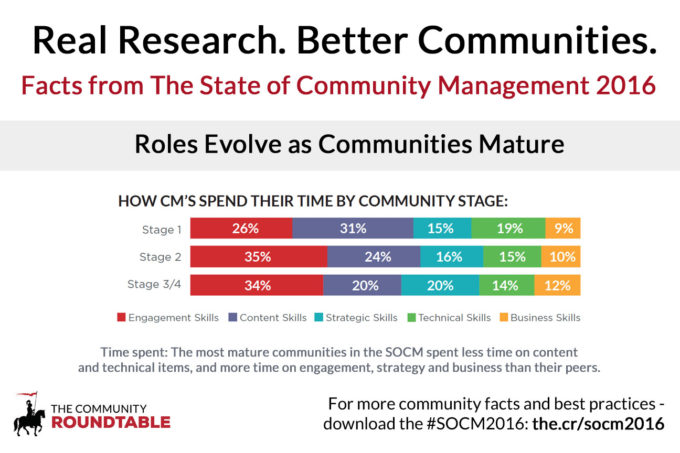By Ted McEnroe, Director of Research and Training
Explaining what you do as a Community Manager is never easy – and it turns out, it’s likely to change as your community matures. That’s right – not every community manager does the same thing, and all community manager roles evolve as their community does. (We can see you nodding along at your desk – this is one of those “I knew it!” type facts that confirms a long held belief in the community community.
In the State of Community Management 2016 survey, we asked respondents how they spent their time among the five skill sets of our Community Skills Framework – Engagement, Content, Strategic, Technical and Business.
Learn more about the Community Skills Framework and the 50 skills of community by downloading our Community Careers and Compensation 2015 report.
We found subtle but noteworthy changes when we compared the skills of Stage 1, relatively immature communities, with those that scored in Stage 3 or 4 on our Community Maturity Model. Early-stage community managers spent the majority of their time on engagement and content skills – 57%. The same held true for more mature communities, but the balance shifted. Whereas early-stage community managers spent the greatest percentage of their time developing content – 31%, Stage 2 and 3 communities spent their time on engagement – 35% and 34%, respectively.

The data show a second shift that happens as a community matures. Stage 1 managers spent almost as much time on technical issues in their community – 19%, as they did on strategic and business elements combined – 24%. By Stage 2, that begins to shift, and in Stage 3 and 4, community managers are spending 32% of their time on strategy and business, and 14% on technical skills.
Age ain’t nothing but a number
What about age? It would make sense that someone in a new community would need to spend more time on content as they ramped it up, so you might think that we’d see the same kinds of shifts with age. Turns out, though, just as with people, maturity and age don’t necessarily go together. Splitting the sample by community age showed absolutely no correlation between community age and how community managers spent their time. Stage 1 communities that were more than 10 years old looked just the same as those started in 2013-2015.
As with so many things in community, the evolution of community manager roles is non-linear. It will happen as your community grows and develops – it’s just not a matter of time.
We can’t wait to hear what you think – tag your thoughts with #SOCM2016 to join the conversation!
Are you a member of TheCR Network? Download the research inside the Network here.
